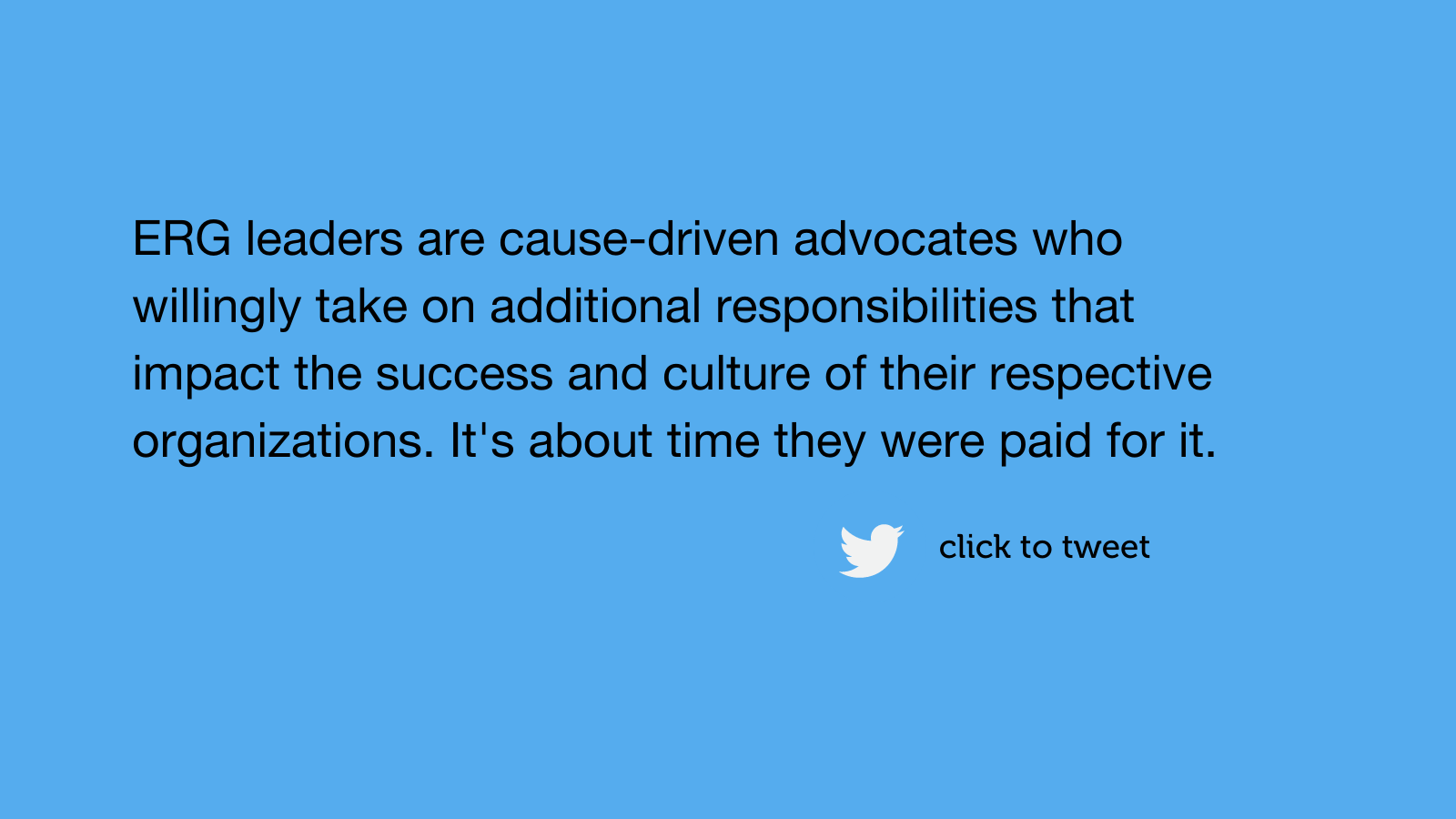Paying for Priceless Work: A Case for Compensating ERG Leaders
It isn't easy to put a price tag on the invaluable benefits Employee Resource Group (ERG) leaders bring to their company, but that doesn't mean we shouldn't try.
JustWorks, a burgeoning HR software company, said it straight: no ERG leaders means no ERGs. Without ERGs, the culture of their company would be at stake. So, they put their money where their mouth is.
The tech organization rolled out an ERG leader compensation package including the usual internal and external recognition, professional development access, funding for conference participation, management coaching opportunities, and formal mentorship. But they took it a step further.
On top of what might be considered "normal" benefits for ERG leaders, JustWorks included cash compensation and stock options. When JustWorks learned that their ERG leaders spend 10-20% of their time on ERG-related responsibilities (on top of their full-time roles), the company sought to course-correct the obvious recognition and compensation gap.
Read JustWorks blog post about “How and Why Justworks Compensates our ERG Leads”
ERG leaders are cause-driven advocates who willingly take on additional responsibilities that impact the success and culture of their respective organizations. It's about time they were paid for it.
JustWorks led the pack in this movement, and others have since joined the bandwagon. Twitter publicly acknowledged its ERG leaders' achievements, dismissing the notion of their work as a 'side hustle' or an 'extracurricular' and formally establishing a compensation program. LinkedIn recently introduced a systemized recognition plan for its 20 global ERG co-chairs and committed to paying $10,000 annually to each leader. But, these companies run in a small circle. Recent research by The Rise Journey revealed that only 5.56% of 70+ companies studied are currently paying their ERG leaders.
What might happen if organizations continue to make ERG leadership a strictly voluntary pursuit? According to J. Stacy Adams Equity Theory, when individuals feel that their input contributed (work) is more than their benefits received (pay), they experience a sense of inequity, distress, and lack of motivation. Let's be honest– this can lead to severe consequences like burnout, isolation, and frustration with internal leadership. Increased benefits, by way of financial compensation, can rebalance the tilted scales.
Still, most companies don't pay their ERG leaders for the additional input. Organizations reap the rewards (increased retention, a culture of inclusion, and leadership preparation) of these leaders and all for free. What's important to note here is that ERG leaders tend to be BIPOC diverse individuals and women. This means companies are asking already underpaid minority employees to do extra work without improving compensation.
There are several ways to compensate ERG leaders for their dedication to their communities and the organization. Every organization is different and will need to tailor its unique compensation plans, but here's a good place to start:
Increase in overall compensation/annual salary
Additional bonuses or stipends for hitting ERG-related goals
Formal dedication of a percentage of their role to ERG work
Funding of memberships to external organizations or for conferences that support their ERGs mission
Financial compensation is in addition to, not in substitution for, the other forms of recognition such as connection with an executive-level mentor, the inclusion of ERG-related work in performance reviews, sponsorship of professional development, and internal and external acknowledgment. For more information on how to determine compensation for ERG Leaders, see Rise Journey's comprehensive guide.
Proper compensation acknowledges the crucial, positive impact of ERGs and fairly pays employees for the additional input they are dedicating to the company. Just because ERG leaders aren't typically seeking out ERG-related work with the comp rewards in mind doesn't mean we shouldn't be talking about it.
JustWorks found that when ERG Leaders feel valued, they are 14% more satisfied, 10% more willing to go above and beyond, and 30% more optimistic about their careers—paying ERG leaders is an organization's investment in the future of their business.
Share your ideas. Solve problems. Make a difference.
We’re building a community where your voice is heard, solutions are shared, and changemakers around the world can mobilize for change. If you are passionate about change, culture, and innovation, this is the place for you.





